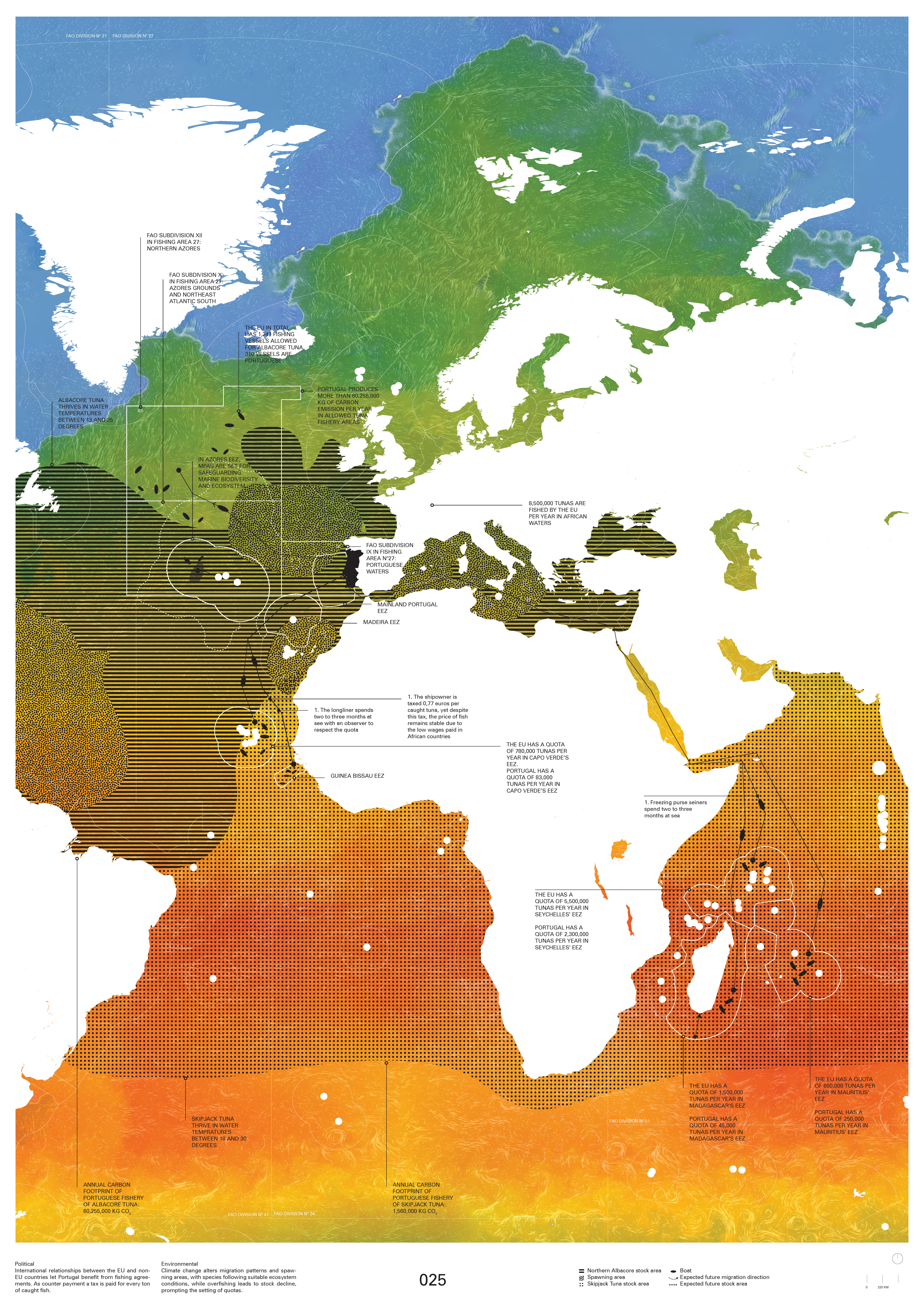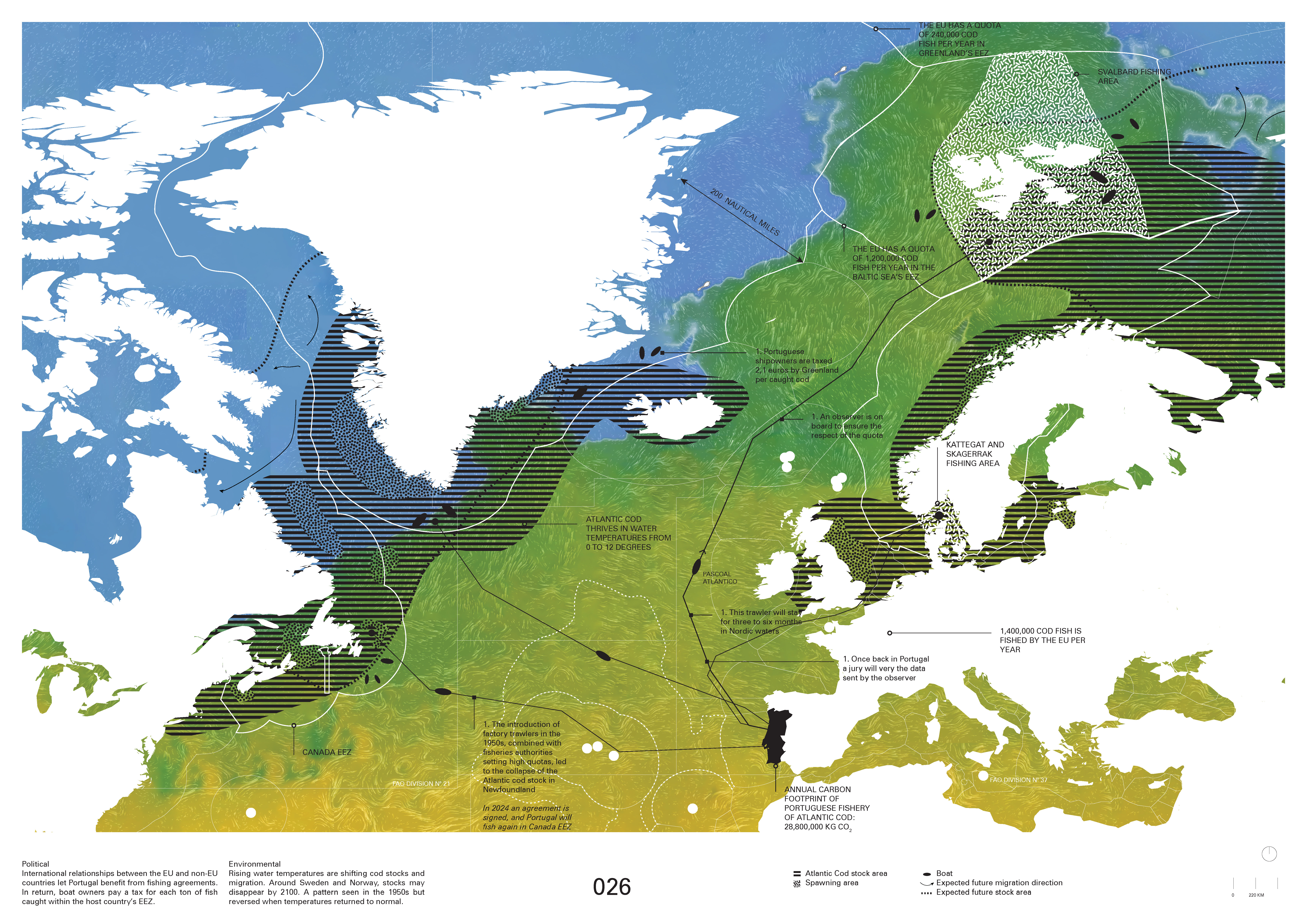Project Global — Spring 2025
Project Global explores how logistics shapes the built environment, this year looking at fish and cork in Portugal, both part of the natural riches of the land, culture, and traditions. Examining Portugal within European and global trade and transportation networks, including the European Atlantic Corridor and the country’s connections across the Atlantic Ocean. It investigates contemporary shifts in the global production and distribution networks of both highly regulated natural resources, and their spatial implications. Part 1: Documentation traces and describes the landscapes, buildings and spaces of fish and cork supply chains. Part 2: Projection extrapolates reflections on future change, with the design of a set of architectural projects.
In the first half of the semester students will trace, describe, and document the logistics environment of Portugal, related to the Atlantic Corridor and the country’s overseas connections, through the lens of fish and cork. Exploring investigative, descriptive, and documentary formats and methods, they will record the spaces, trajectories, materials, and rhythms that form part of—mostly diagrammatically represented—supply chains, and associated value chains.

Collectively addressing the natural resource within environments of cultivation and extraction at different scales. Measured drawings, annotations, infographic elements, selected original material and captions include spatial, material, biological and technological information, with relevance to the species, environments, and processes of extraction, addressing current conditions and social, economic, and environmental factors of influence.











Fish, Fishing Grounds, and Fishing Areas
Cork Tree, Cork Forest, and Cork Regions
Continuing from the documentation of the natural resources, students will trace their path into specific products, following the supply chains that organize their production and distribution. To address a broad scope of logistical conditions, the selection of products will range from little to highly processed, and from affordable to luxury goods.
Cod Liver Oil




Sardine Can




Sashimi




P50 TPS





Acoustic Tiles





Footbed




Granules


Along with the drawing dossier that frames and contains the contribution of drawn documentation of the natural resources and supply chains, students will work on two more collective outputs. A podcast series that captures expert input, engaging experts with different backgrounds, and a documentary film that records the logistics environment of fish and cork production and distribution, its spaces, trajectories, materials, and rhythms.
Podcast series
Talking Fish & Cork
Talking Fish & Cork
Talking Fish & Cork explores the spatial implications of the fish and cork industries in Portugal through the lens of architectural spaces and their related objects. It consists of a series of conversations between architects and experts found along the logistics chain of these two natural resources. Departing from an object selected by the invited guests, a discussion unfolds to discover more about the processes, trends, territories, and buildings associated with fish and cork.
Listen in Spotify
Documentary film
Punching & Canning
Punching & Canning
The documentary film Punching & Canning captures a day in two Portuguese factories producing cork stoppers and canned sardines.



During the second part of Project Global, each student will produce an architectural project that addresses the future of the landscapes, buildings, spaces, and objects that form the environment of fish and cork production, distribution, and consumption in Portugal. Each architectural project, considered an individual contribution to the collective scenario, will be spatialized and drawn in a clear set of annotated orthographic drawings, which each serve a distinct conceptual purpose in its development. Each contribution is brought together in a single-rendered cinemagraphic representation, a still photographic representation in which a minor and repeated movement occurs.
Banking on Carbon
Yingxin Zhang
Yingxin Zhang
The Carbon Bank operates as a decentralized network of local branches across Europe, that provide carbon accountability, real-time ecological monitoring, and public trust through carbon accounting, directly within municipal territories.










Kelp Campaigns
Ravenna Westerhout
A nomadic test kitchen travels Portugal’s coast to make the shift from a fish-based diet to a kelp-based diet desirable, reimagining national cuisine through seasonal harvests, local partnerships, and regenerative fishing practices.
A nomadic test kitchen travels Portugal’s coast to make the shift from a fish-based diet to a kelp-based diet desirable, reimagining national cuisine through seasonal harvests, local partnerships, and regenerative fishing practices.







Caught-to-order
Imane Amzil
A source-based fish auction market makes ecological variations tangible and actionable, based on precision fishing, and technological performance, transforming the wild-caught fishery market into a new bidding model.
Imane Amzil
A source-based fish auction market makes ecological variations tangible and actionable, based on precision fishing, and technological performance, transforming the wild-caught fishery market into a new bidding model.







Kelp Forest
Britt De Schoenmakere
Kelp farms provide a reliable source of sustainable food, sequester carbon, and support marine biodiversity, establishing a productive model for climate-resilient coastal economies.
Kelp farms provide a reliable source of sustainable food, sequester carbon, and support marine biodiversity, establishing a productive model for climate-resilient coastal economies.







Cork Skin
Eleni Magnisali
Expanded agglomerated cork, made from pruning waste, virgin, and fire-damaged cork, delivers high-performance insulation for buildings, shifting the focus of the cork industry from stoppers to sustainable construction materials and providing biobased insulation across Europe.
Eleni Magnisali
Expanded agglomerated cork, made from pruning waste, virgin, and fire-damaged cork, delivers high-performance insulation for buildings, shifting the focus of the cork industry from stoppers to sustainable construction materials and providing biobased insulation across Europe.







Cork it Up
Gabi Stabile
In a new three-year harvesting cycle, knowledge-based agroforestry practices focused on shrub management and fire protection ensure the long-term preservation and expansion of mature cork forests, while supporting a profitable farm model that integrates both high productivity and high biodiversity.
Gabi Stabile
In a new three-year harvesting cycle, knowledge-based agroforestry practices focused on shrub management and fire protection ensure the long-term preservation and expansion of mature cork forests, while supporting a profitable farm model that integrates both high productivity and high biodiversity.








Farmville
Claire Demeyere
Farmville is a rural revitalization project in Villa Cha that challenges conventional models of ownership and labor by transforming traditional family farming into a communal-based system, blurring the lines between making a living, living sustainably, and reimagining how communities are built.
Claire Demeyere
Farmville is a rural revitalization project in Villa Cha that challenges conventional models of ownership and labor by transforming traditional family farming into a communal-based system, blurring the lines between making a living, living sustainably, and reimagining how communities are built.








Contributors
Imane Amzil (MA)
Claire Demeyere (BE)
Britt De Schoenmakere (BE)
Eleni Magnisali (GR)
Gabi Stabile (BR)
Ravenna Westerhout (NL)
Yingxin Zhang (CN)
Imane Amzil (MA)
Claire Demeyere (BE)
Britt De Schoenmakere (BE)
Eleni Magnisali (GR)
Gabi Stabile (BR)
Ravenna Westerhout (NL)
Yingxin Zhang (CN)
Teaching team
Juan Benavides
Sanne van den Breemer
Salomon Frausto
Benjamin Groothuijse
Juan Benavides
Sanne van den Breemer
Salomon Frausto
Benjamin Groothuijse
Experts
Joana Azevedo
Tadeáš Říha
Diego Inglez de Souza
André Tavares
Paulo Vaz-Pires
Amorim Cork Solutions
Amorim Florestal
Conservas Pinhais
Cork Matters Concept Store
Corticeira Amorim
Docapesca—Portos e Lotas, S.A.
EFP Biotek
J.V. Cortiça Unipessoal
Mofase
Pascoal & Filhos, S.A.
Ramirez & Sons, S.A
S&CC Portugal
University of Porto
Joana Azevedo
Tadeáš Říha
Diego Inglez de Souza
André Tavares
Paulo Vaz-Pires
Amorim Cork Solutions
Amorim Florestal
Conservas Pinhais
Cork Matters Concept Store
Corticeira Amorim
Docapesca—Portos e Lotas, S.A.
EFP Biotek
J.V. Cortiça Unipessoal
Mofase
Pascoal & Filhos, S.A.
Ramirez & Sons, S.A
S&CC Portugal
University of Porto
Special thanks
Mick Morssink
Nicolette van Dongen
Estrella van de Swaluw
Tessa Wijtman-Berkman
Mick Morssink
Nicolette van Dongen
Estrella van de Swaluw
Tessa Wijtman-Berkman